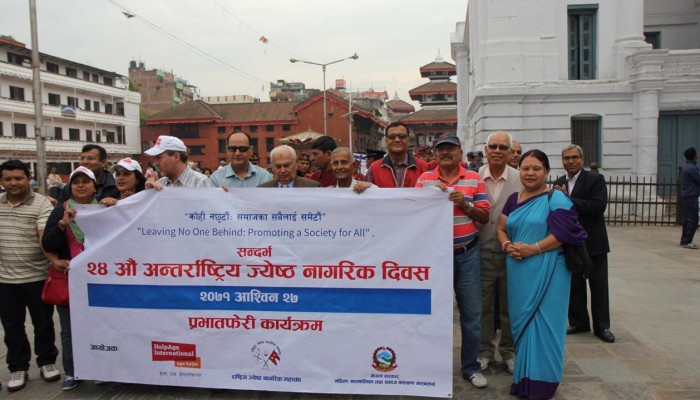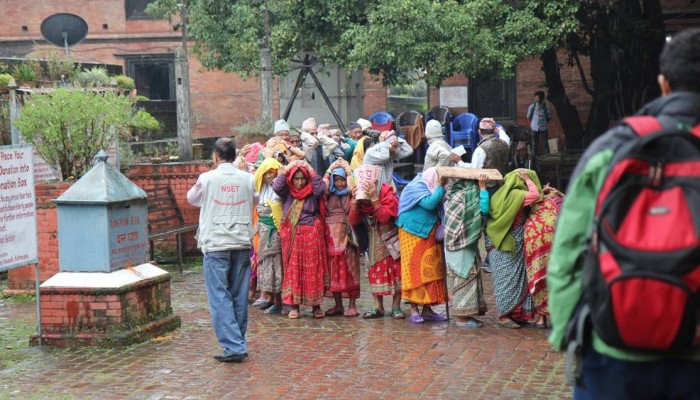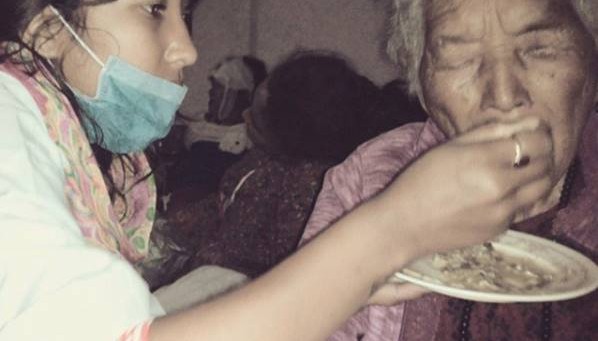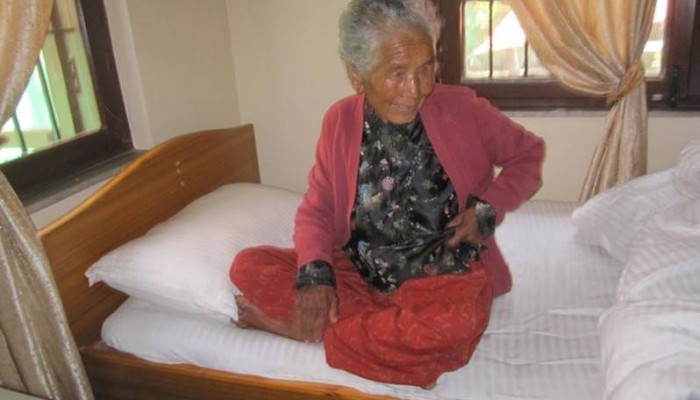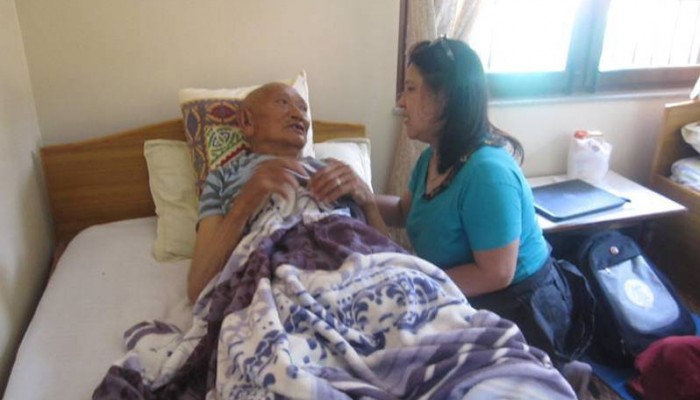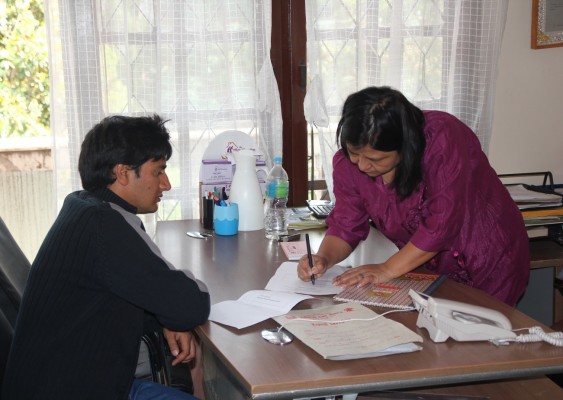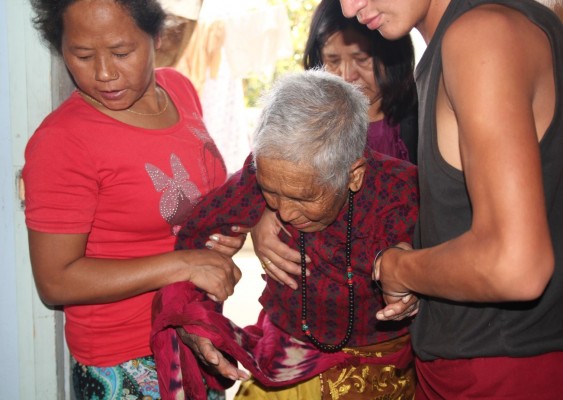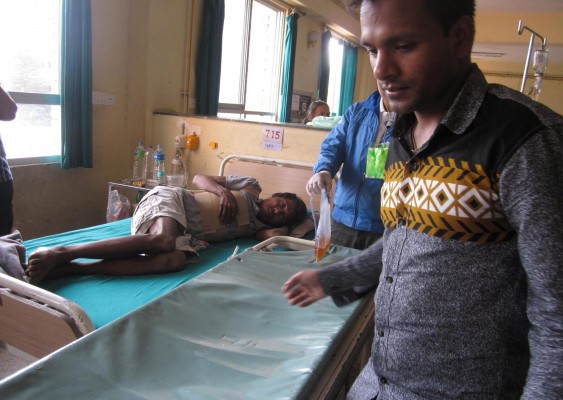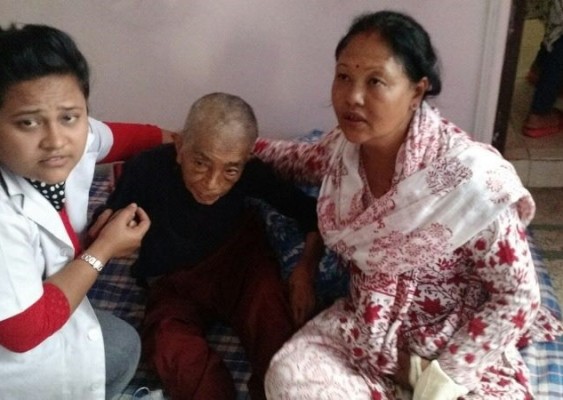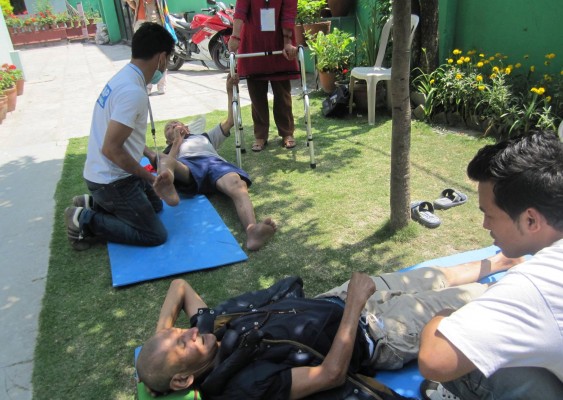Patron in Heidelberg: Roberta Mandoki
Older people, especially the so-called old-old, are a very vulnerable group during natural disasters and their aftermath, but are often neglected in relief efforts. The earthquake in Nepal has left many elderly people in a difficult situation, particularly those without any family and in the heavily affected regions. Also, a considerable number of injured people get evacuated to hospitals in Kathmandu for medical treatment, but have no place to stay afterwards if their houses are destroyed or damaged. When they suffer from chronical diseases like diabetes or dementia, older people need medical assistance and care which is difficult to provide under the current circumstances in Nepal.
During my research, I met Pramila Bajracarya Thapa, who has founded The Hope Hermitage, a senior citizens club and small old people’s home in Kathmandu. As a short-term support action, she has together with her team decided to offer free shelter and medical care for elderly people in need during the next 6 months. The project has a particular focus on elderly from the worst-affected areas, and is developing a long-term strategy according to their needs which will only fully reveal during the next few months. During the last days, they have already admitted some older persons who are in difficult health or mental state, or do not know about their family member’s whereabouts. However, Pramila Bajracarya Thapa and her team have not been receiving any financial support for her project yet.
These are parts of Pramila Bajracarya Thapa’s call for support from Kathmandu: “This is to inform you all that Hope Hermitage Nepal is giving short-term and long-term shelter (with all care required) for the senior citizens, who have been badly affected and left with no care at all due to the deadly earthquake in Nepal. If you know/find any such senior citizens who are in dire need of shelter and care, Hope Hermitage Nepal is the right place to contact for. Due to lack of human resource, we are ourselves not able to visit the field and receive/pick up the “Grand Parents”. So, please help us in getting the “Aama-Buwa”[mothers and fathers] who are left alone with no care at all.“
On May 6, an injured elderly man was brought to the Hope Hermitage by volunteers, and most probably there will be many more similar stories: 80-year-old Narbu Sherpa, an earthquake victim from Sindhupalchok, was evacuated by a Nepal Army Helicopter to Norvic Hospital. He received free treatment at the hospital, but when discharged he had nowhere to go, as his house is totally damaged and he has no idea about his family whereabouts. A Sherpa volunteer from Boudha brought him to Hope Hermitage where he is now given shelter, care and support. He had a surgery done in his right leg and needs to remove stitches in the following week.
With the help of your donations, we are able to support this humanitarian initiative, so that the Hope Hermitage can admit more elderly people and give them adequate and professional care. We will also collaborate with the Hope Hermitage in order to develop a long-term strategy. At the same time, we will continue to look for other local long-term rehabilitation projects for the welfare of older people after this devastating disaster (see e.g. Rebuilding Bungamati), and will keep this page updated.
However, the resilience, repository of knowledge, and relief efforts of older people after the earthquake in Nepal should also be acknowledged. You can soon find a report about this in the news section.
— The anthropologist Roberta Mandoki is PhD Candidate at the Cluster’s research project “Ageing in a Transcultural Context” and has just recently completed her fieldwork on ageing experiences of older people in the Kathmandu Valley. She works on Ageing in Nepal jointly with Christiane Brosius and Axel Michaels.
Update 29.05.2015
Although there are still strong aftershocks all over Nepal, the situation in Kathmandu slowly reveals which initiatives and measurements are needed for medium-term relief. The situation at The Hope Hermitage has also slightly changed, but the continuous aftershocks are hard to live with, and after the strong second earthquake on May 12, everybody had to sleep in the lawn outside again until the aftershocks got less. This is especially difficult with elderly residents who need constant nursing care, and one should not forget how challenging this must be for the caretakers who have their own families to take care of, too.
Pramila Bajracharya Thapa writes to me that her small old people’s home has quickly filled up with more elderly earthquake victims who are in a very vulnerable state. On May 12, just shortly after the second earthquake, our colleague Rajan Khatiwoda visited The Hope Hermitage and handed over a first lump sum of 1000 Euro to Pramila, so that she could cover immediate costs. Since then, she and her team have been supported in their work by different medical professionals and volunteers, e.g. for providing the necessary physiotherapy for injured elderly.
I have got to know Pramila as a dedicated person who approaches her work in a very professional and well-organized way. Yesterday, Pramila wrote that her small project has become very challenging since many of the elderly residents need intense medical care: “Currently, I am busy and staying at Hope Hermitage 24 hours a day. We have most of the seniors injured, those discharged from hospitals and need constant care, it’s really difficult to take care of those seniors who are badly traumatized and don’t have sense at all. They have lost everything including family members, and it’s really challenging for us working to bring them to [back to] normal. I often don’t even have time to check my email.” (email conversation, May 28, 2015). She highlighted that some of them suffer from trauma and therefore are highly mentally disoriented. This necessitates intense one-to-one care, so that Pramila has to hire further caretakers. Although different organizations have shown interest in this project, Pramila has only received little financial support for taking care of these people.
Although one could argue that the impact of this project is not affecting a large number of people, these elderly people are in a situation where they can’t help themselves because of their health condition. Our donation fund will continue to support the project to ensure that their health condition can improve and they can slowly overcome their trauma.
